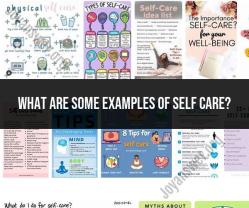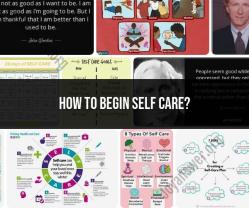What happens if you dont take care of yourself?
Neglecting self-care can have significant and far-reaching consequences on your physical, emotional, and mental well-being, as well as your overall quality of life. Here are some of the potential consequences of not taking care of yourself:
Physical Health Issues:
- Increased risk of chronic illnesses: Neglecting proper nutrition, exercise, and sleep can lead to a higher risk of conditions like heart disease, diabetes, and obesity.
- Weakened immune system: Chronic stress and lack of self-care can weaken your immune system, making you more susceptible to illnesses.
- Fatigue and low energy: Inadequate sleep and self-care practices can lead to chronic fatigue, decreased energy levels, and overall physical weakness.
Mental Health Challenges:
- Increased stress and anxiety: Neglecting self-care can contribute to high stress levels and chronic anxiety, making it difficult to manage daily challenges.
- Depression: Prolonged neglect of self-care can contribute to feelings of sadness, hopelessness, and depression.
- Burnout: Overworking and neglecting rest can lead to burnout, characterized by emotional exhaustion and reduced productivity.
Emotional Consequences:
- Reduced emotional resilience: Neglecting self-care can make it challenging to cope with life's ups and downs, leading to emotional instability.
- Irritability and mood swings: Chronic stress and lack of self-care can result in mood swings, irritability, and difficulty regulating emotions.
- Decreased self-esteem: Neglecting self-care may contribute to a negative self-image and decreased self-esteem.
Impaired Relationships:
- Neglecting self-care can lead to neglect of important relationships as well. When you're emotionally and physically drained, it can be challenging to provide support and maintain healthy relationships.
- Increased conflict: High stress and emotional instability can lead to conflicts in relationships, both personal and professional.
Reduced Productivity and Performance:
- Neglecting self-care can impact your ability to focus, concentrate, and perform well at work or in daily tasks.
- Decreased motivation: Lack of self-care can lead to reduced motivation and enthusiasm for personal and professional goals.
Decreased Quality of Life:
- Overall, neglecting self-care can result in a reduced quality of life. It may prevent you from enjoying hobbies, pursuing passions, and engaging in activities that bring joy and fulfillment.
Long-Term Health Consequences:
- Over time, chronic neglect of self-care can lead to the development of severe health conditions, decreased life expectancy, and a lower quality of life in later years.
It's essential to recognize that self-care is not a luxury but a fundamental necessity for overall well-being. Prioritizing self-care allows you to recharge, manage stress, maintain physical and mental health, and nurture positive relationships. It's never too late to start incorporating self-care practices into your life, and doing so can lead to significant improvements in your health and happiness.
Consequences of Neglecting Self-Care and Personal Needs
Neglecting self-care and personal needs can have a number of negative consequences, including:
- Physical health problems: Neglecting self-care can lead to physical health problems such as obesity, heart disease, stroke, diabetes, and depression.
- Mental health problems: Neglecting self-care can lead to mental health problems such as anxiety, depression, and stress.
- Relationship problems: Neglecting self-care can make it difficult to maintain healthy relationships with others. When we are not taking care of ourselves, we are more likely to be irritable, impatient, and withdrawn.
- Reduced productivity: Neglecting self-care can lead to reduced productivity at work or school. When we are not taking care of ourselves, we are more likely to be tired, stressed, and unable to focus.
- Burnout: Neglecting self-care can lead to burnout. Burnout is a state of emotional, physical, and mental exhaustion caused by prolonged or excessive stress.
Health and Relationship Effects of Ignoring Self-Care
Ignoring self-care can have a significant impact on your health and relationships.
Physical health: When you neglect self-care, your body is more likely to experience stress, which can lead to a range of physical health problems, including:
- Headaches
- Stomach aches
- Muscle tension
- Fatigue
- Difficulty sleeping
- Weakened immune system
- Increased risk of chronic diseases such as heart disease, stroke, diabetes, and cancer
Mental health: Ignoring self-care can also lead to mental health problems, such as:
- Anxiety
- Depression
- Stress
- Irritability
- Difficulty concentrating
- Lack of motivation
Relationships: When you neglect self-care, you may be less patient, irritable, and withdrawn. This can make it difficult to maintain healthy relationships with others.
Signs You Are Not Making Yourself a Priority
Here are some signs that you may not be making yourself a priority:
- You are constantly feeling stressed and overwhelmed.
- You are not getting enough sleep.
- You are not eating a healthy diet.
- You are not exercising regularly.
- You are not taking time for yourself to do things you enjoy.
- You are constantly putting the needs of others before your own.
- You feel guilty or selfish when you take time for yourself.
If you are experiencing any of these signs, it is important to start making yourself a priority. Self-care is not selfish; it is essential for your physical, mental, and emotional well-being.
Here are some tips for making yourself a priority:
- Schedule time for self-care in your day and stick to it.
- Say no to things that you don't have time for or that you don't want to do.
- Delegate tasks to others.
- Set boundaries with others.
- Do things that you enjoy and that make you feel good.
- Take care of your physical health by eating a healthy diet, getting enough sleep, and exercising regularly.
- Take care of your mental health by managing stress, practicing relaxation techniques, and connecting with loved ones.
Making yourself a priority is not always easy, but it is worth it. When you take care of yourself, you are better able to take care of others and to live a happy and fulfilling life.







